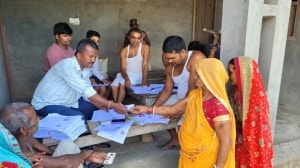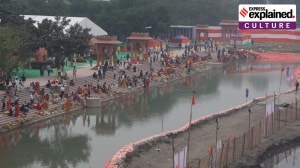The real Madhukar Zende, now 88, is far less flamboyant in person, but no less unforgettable. He brushes aside the “super cop” label. “I am a simple man who did his duty,” he insists. Yet his career brimmed with moments that could have leapt from a film reel: staring down sword-wielding robbers, hauling in smugglers with powerful patrons, negotiating with rioters, capturing Sobhraj, and even taking the stage as Shivaji and not to forget, a story-book love story.

I sat down with him at his daughter-in-law’s house in Vasant Kunj, New Delhi, for a long conversation about his life, his philosophy, and the turbulent city he once policed.
Story continues below this ad
How does it feel to have your life portrayed on screen?
Naturally one feels happy. But there was already a biopic on my life where I acted myself. I have not yet seen the trailer of Inspector Zende. Manoj Bajpayee never spoke to me before playing the role. The director told him, “Don’t meet him. You have your own ideas.” We met only during the last shot of the film. When I saw him, I was shocked. He knew so many things about me. He had studied my character deeply. Of course, they say they made it a bit comical. They are bound to take cinematic liberties. But I am neither rough nor funny. I am a human being.
What was the most complex case of your career?
Sobhraj. In 1975, he escaped, though I arrested his girlfriend. Later, in Goa, a telephone operator told me foreigners were making lightning calls from a restaurant. A young motorcycle mechanic also gave me a clue. We waited, and by luck, Sobhraj walked in. But I never say I did it alone. From the DGP to constables, everyone contributed. Even newspapers. I just happened to be the one who caught him.
You had arrested him earlier too.
Yes, in 1971, in Delhi. He had come to rob the Air India office. Those days crores of rupees were kept in cash. He had foreigners with him, weapons, smoke bombs, hand grenades. Before he could act, I arrested him. The Delhi government gave me Rs 1,500 as reward.
 French National Charles Sobhraj leaves the court together with his lawyer Jacques Verges. Sobhraj who has linked to several unsolved murders in Asia in the 1970s, was charged with poisoning his return to France after spending 20 years in Indian Jails. (Express photo)
French National Charles Sobhraj leaves the court together with his lawyer Jacques Verges. Sobhraj who has linked to several unsolved murders in Asia in the 1970s, was charged with poisoning his return to France after spending 20 years in Indian Jails. (Express photo)
What about Dawood Ibrahim?
Once both Dawood and the police was looking for a man accused of murder. I managed to find them in the dangerous Kalupur area. Dawood was shocked. He asked, “How could you do it?” But again, it was not me alone. My constables, my sources, everyone contributed.
Story continues below this ad
You have been called a “super cop.” What elevates an ordinary cop?
People have given me that title. I never claimed it. I am a very simple man. I did my duty. Act well your part, and there all the honor lies. That was my maxim.
I am also a student of the Gita. In the sixth chapter, Krishna advises Arjun: if you do good, nothing bad will happen to you. I have always followed that.
There is a story in your book, Mumbai’s Most Wanted, of you facing down five armed men.
I was on my scooter when I saw a constable stop a taxi. Men jumped out with swords and went to attack him. I threw the scooter aside, shouted loudly, and ran at them. They were surprised, froze, and started running. We caught two.
The next day, the newspaper published a big article. The chief minister phoned my commissioner. He gave me a reward of 2,000 rupees. When he gave it, he said, “I will not shake hands with you,” and instead put his hand on my shoulder and took a photo. That was respect.
Story continues below this ad
You arrested Haji Mastan personally….
He had assaulted a constable. I was agitated. How could anyone assault a policeman? I dragged him to the lockup myself, before anyone could say anything.
Gangsters were politically connected. Did you face pressure?
Once, when I arrested someone, a politician phoned me. I told him: “Sir, you are a big man. I am a small inspector. Please speak to my commissioner.” And I hung up. He never called again. Those days, political pressure was not that strong.
While working in sensitive localities during times of communal tension, what approaches did you take to maintain safety, promote harmony, and build confidence within the community?
During Ramadan, I distributed roses. I started that in 1980, and later many police officers across Maharashtra followed it. After the Babri Masjid fell, riots broke out. A constable was stabbed, mobs surrounded our vehicle, and we thought we would be burned alive. But my rapport saved us. Years later, an officer came and touched my feet. He said, “Sir, I am alive because of you.” That was my greatest reward.
Did you face criticism for being close to a particular community?
Yes. Some people approached Bal Thackeray. He wrote that I was “Green Zende,” helping only one particular community. I wrote him a long letter. I told him: the first statue of Shivaji in the world was erected at my grandfather’s instance. Gundas have no religion. Their only religion is money.
Story continues below this ad
To his credit, he published my letter in full. Later, he even told a Shiv Sena MLA to tell me: “What Zende said has come true.”
You also acted in plays.
Yes, I acted as Shivaji in many dramas. People knew I was impartial. I could celebrate Hindu history while also studying the Quran. That balance helped me.
In your book, you write you often went beyond the call of duty. Does that spirit still exist?
It is always there. Some policemen are bad, but many are good. Our ideal was the British “Bobby.” Robert Peel said: disarm them, give them only a small baton, and tell them, go to people’s homes and help. If a lady is sick, make her tea. If she cannot drop her daughter to school, you do it. That is what we learned.
You write that you married the most beautiful girl in your locality. What is the story?
Her father arranged her marriage to a doctor when she was 18. She refused. She ran away, came to my police training school, and said, “I want to marry you.” I called her father and told him that she had come to me. They took her back, but then relented as she was adamant about marrying me. His only condition was that we marry the same day, which we did. The doctor then married her younger sister.
Story continues below this ad
She was from a backward community, I am Maratha. My father was furious when he found out. For years, he did not speak to us. When my son was born, he softened. Later, he loved her more than me.
At that time, it was sensational. But today, my grandchildren have married Jains and Christians. In my house, religion and caste do not matter.
Today, many citizens mistrust the police. Do you think the force has changed?
Nothing has changed. There are still many good policemen, but only the bad ones are projected.
Do younger officers seek your advice?
Not really. After retirement, I have not stepped in a police station. Once, a commissioner called retired officers for consultation, but I found that young people do not want old advice. Times are different. Every generation is bound to be better than the previous one.
Story continues below this ad
What advice would you give to young policemen?
You must have the tendency to help, and to be honest. Follow the law and your conscience. Mistakes will happen, but if they are genuine, it does not matter. I never saw myself as a hero. I was fortunate to serve. That is enough.



 French National Charles Sobhraj leaves the court together with his lawyer Jacques Verges. Sobhraj who has linked to several unsolved murders in Asia in the 1970s, was charged with poisoning his return to France after spending 20 years in Indian Jails. (Express photo)
French National Charles Sobhraj leaves the court together with his lawyer Jacques Verges. Sobhraj who has linked to several unsolved murders in Asia in the 1970s, was charged with poisoning his return to France after spending 20 years in Indian Jails. (Express photo)





























